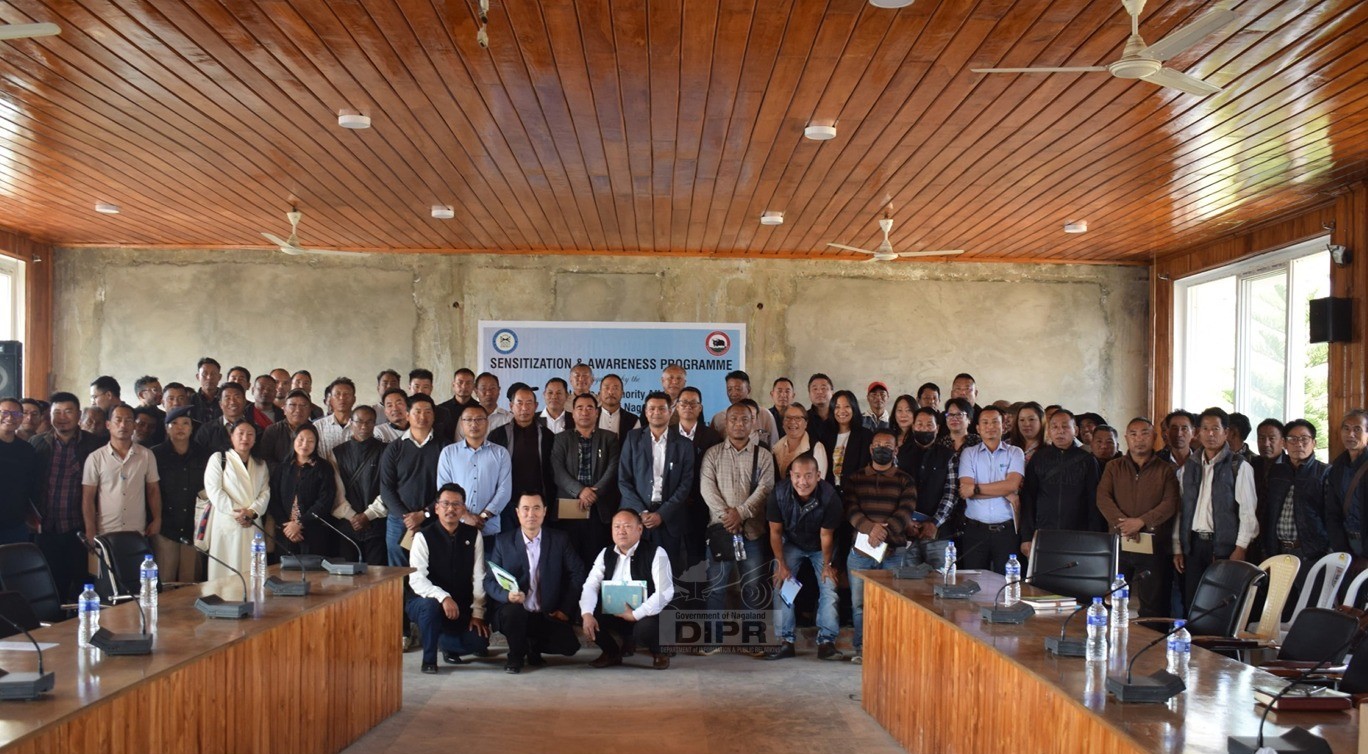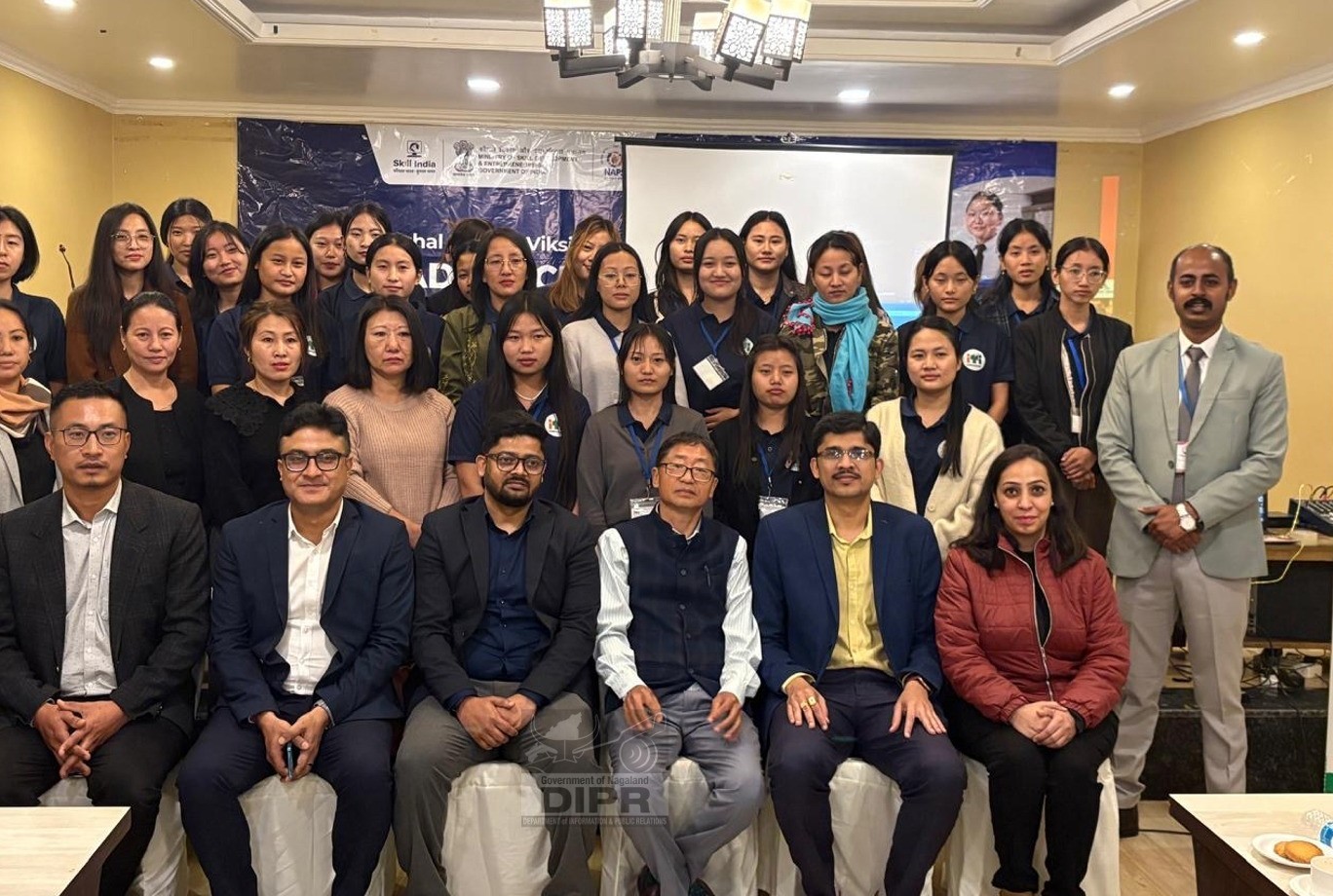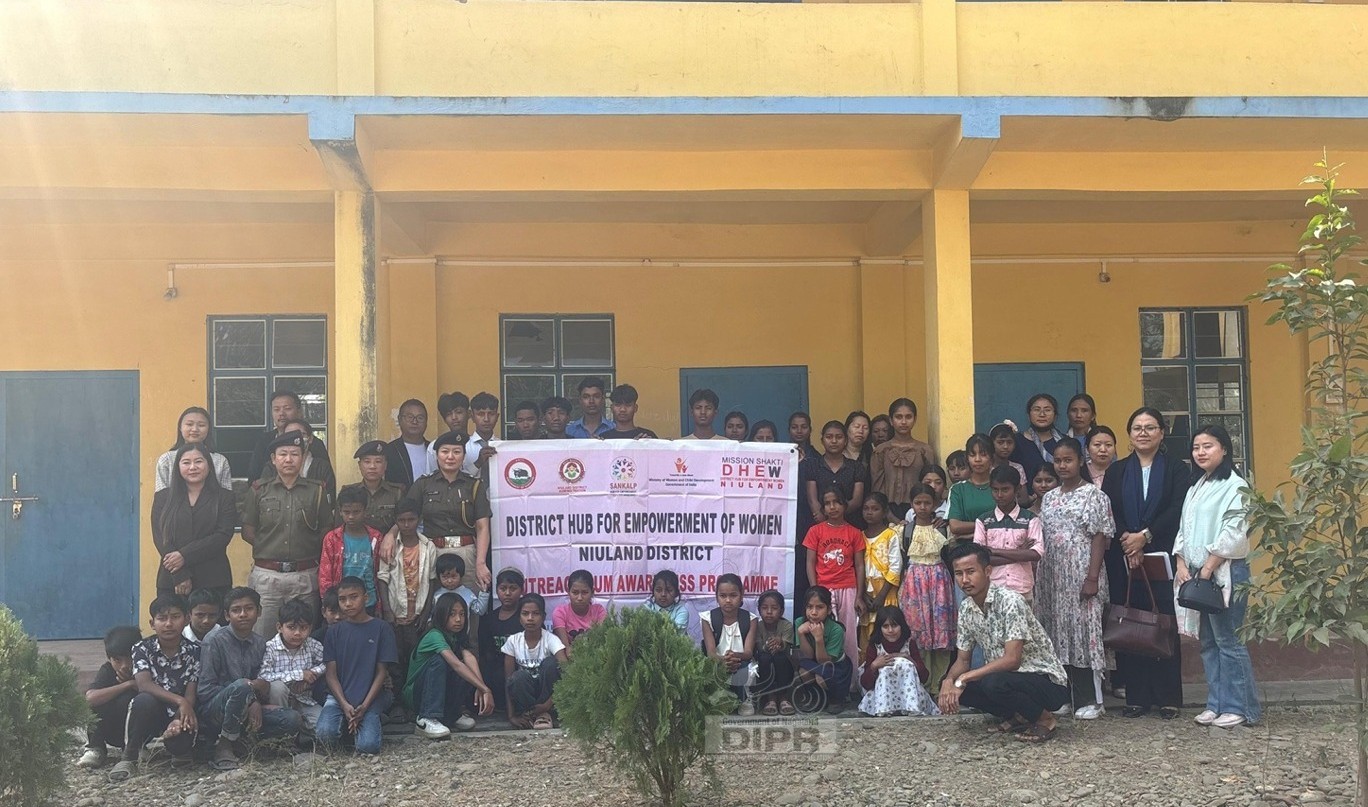The tenth session of the Thirteenth Nagaland Legislative Assembly (NLA) was held on 20th December 2021 at the NLA Secretariat, Kohima. The members of the NLA observed two minute silence in memory and honour of the 14 (fourteen) people killed at Oting-Tiru village area of Mon district on 4th December 2021.
Commissioner & Secretary, NLA, P. J. Antony reported the assent of the Governor of Nagaland to the following Bills:
1. Nagaland Appropriation (No. 5) Bill, 2021
2. Nagaland Appropriation (No. 6) Bill, 2021
3. Nagaland Appropriation (No. 7) Bill, 2021
Initiating the discussions on the Armed Forces (Special Powers) Act (AFSPA) Deputy Chief Minister, Y. Patton stated that as per Section 3 of the AFSPA, 1958, the provisions of the said Act come into force, in any area to which the Act extends, which gets declared as a ‘disturbed area’ by the Central Government or the Governor of that State, if in the opinion of either, the area is in such a disturbed or dangerous condition that the use of armed forces in aide of the civil power is necessary. He mentioned that the Government of India has been declaring the entire State of Nagaland as a ‘Disturbed Area’ by issuing notifications every six months, and thereby keeping the provisions AFSPA, 1958 operative in the State for the past many decades. The latest notification issued by the Government of India was on 30th June 2021, and it is operational up till 29th of December 2021.
He said the provisions of AFSPA, by its nature, scope and intent, gives undue and excessive powers to the security forces to take several coercive actions like search, seizure, arrest of suspected persons and use of firearms, even to the extent of causing death; for all the actions that may be taken by the personnel of the security forces, there is a great deal of immunity provided to them. Patton pointed out that the power and immunity has led to many instances of gross abuse by the members of the security forces, over the years, the most recent being the ghastly firing incident in Oting-Tiru village area of Mon district which led to the loss of the lives of 14 (fourteen) Konyak brothers.
Patton informed that the Government of India seeks the opinion of the State Government, before deciding on extending the Notification for Disturbed Area in the State, every six months. The State Government has consistently opposed the Notification declaring Nagaland as a Disturbed Area on the grounds that the overall law and order in Nagaland has been good for many years now, and on and on, many crime and other similar indicators, the situation is found to be better than many other states of the country. Further, all the Naga Political Groups are in ceasefire with the Government of India for many years now. In addition, the ongoing peace talks are proceeding in the right direction giving hope of an early solution to the Naga Political Issue. The Government of India, however, has always been, based on its own assessment, extending the Notification declaring our State as a ‘Disturbed Area.’ Patton added that the sentiments of our people are strongly against the continuance of AFSPA anymore in our State, that we do not deserve to be designated as a ‘Disturbed Area.’ Henceforth, he urged each and every Member of the House to unitedly call upon the Government of India to see the situation on the ground, listen to the voice of the people, and take the most justified and correct step by withdrawing the operation of the AFSPA, 1958 from the State of Nagaland.
Participating in the discussion on matters of urgent public importance-the AFSPA, Dr. Chumben Murry expressed that the dark side of Indian democracy created by the AFSPA is such that, horrendous acts of omission and commission have been committed under the Act and has caused mistrust, fear and untold miseries on the people of the State. It has served to alienate Nagas from rest of the Country rather than bring them closer for peaceful co-existence. Even after 60 years of the draconian Act, many Indian leaders and the Indian Army alike have not realised or choose to ignore that application of AFSPA continue to result in fostering anti-Indian feelings amongst the people of the State. He stated that at a time when people were hopeful that solution is around the corner, the unfortunate gruesome massacre in Oting, Mon district has created confusions in the minds of the people as to the sincerity of the Central Government as far as the Naga Political Issue is concerned. The intention to hide the crime and misinforming the Union Home Minister to give a wrong statement in the Parliament further angered the people of Nagaland. It is an unforgiveable crime over a crime and will never be forgotten. The ghastly act of the Army will definitely be written in the hall of infamous crimes & grievous violation of human rights. Therefore, he appealed to the House to repeal the draconian AFSPA 1958.
Participating in the discussion, MLA, Imkong Imchen said that the ‘genocide’ committed on 4th December 2021 at Oting village under Mon district is one of the most glaring examples of the thousand genocides committed by the Indian security forces during the last 70 years, calling it a well and pre-planned incident. He added that there were loopholes even on the part of the District Administration and Police, and said it should be thoroughly probed and investigated by a competent authority even higher than the State SIT, preferably a judicial probe headed by a retired Judge of a High Court or the Supreme Court. He condemned the Union Home Minister’s wrong statement of the 4th December 2021 Oting firing incident, calling it misleading and not based on the factual happening, adding that the investigating agency should also take into account of this specific episode. He appealed that the August House passes a resolution urging the Government of India to Revoke/Repeal the AFSPA 1958 from the law of the land in India and make it a redundant/invalid law.
Regarding the Naga Political Issue, Imkong stated that it is almost 25 years since the ceasefire declaration and peace talks in 1997. Till date, there is no sign of any progress/headway being made out of this countless rounds of talks, adding that Naga people deserve to know what is happening to their destiny. Absolute secrecy and confidentiality may be good but only to a certain extent.
Minister Paiwang said that even after the attainment of statehood on 1st December 1963, AFSPA continues to be enforced despite resistance by the Nagas and killings of innocent Naga lives. AFSPA gained more hatred after the Oting-Tiru tragic incident where 13 civilians were killed and another one at Mon Hq and many critically injured and be it in the Region, State, North East, National and Internationally, we are witnessing the demand for justice in the form of repealing AFSPA and to punish those people who were responsible for the tragic killing in Tiru and Mon. He said that Nagaland is witnessing peace except for cases of extortions and illegal taxation here and there, we can now see shops and business establishments opening up and leading to economic expansion. So, now is the appropriate moment to repeal the AFSPA and the Disturbed Area Act and make the people of Nagaland and the North Eastern States closer to the nation.
Paiwang said on 4th December 2021 evening, sometime around 16:30 hours, the 21 Para Special Force ambushed and killed six civilians and two persons were critically injured, and after almost five hours gap at around 21:30 hours, another clash took place with the public from the village who came down looking for the boys who had left the coal mine areas on a pickup bolero towards the village. In the second incident, seven more civilians were killed after which the army fled towards the Assam side. He said that on 5th December 2021, accompanied by Nagaland Commissioner, Nagaland DGP, they reached Oting village and held meeting with the Village Council, pastor and church leaders, GBs, VGs and the village elders, where the government assured them that the high level Special Investigation Team was constituted and justice would be served. He mentioned that the State Government has extended the ex-gratia of Rs. 5 (five) lakh each and the Central Government Rs. 11 (eleven) lakh each to the dead, Rs. 1(one) lakh each to those seriously injured and Rs. 50,000 (fifty thousand) to those with minor injuries.
Paiwang mentioned that justice as demanded by the Eastern Nagaland People’s Organisation is repealing of AFSPA from Nagaland and awarding befitting punishment to those responsible for the tragic incident, but equally important is compensating the victims’ families in providing government jobs as committed by the Union Home Minister and, he appealed that it must be done at the earliest.
MLA, Y. Vikheho Swu pointed that in the campaign for Repeal of AFSPA, so many regional civil society organisations have lent their support. In mainland India too, organisations like the People’s Union for Democratic Rights (PUDR) and People’s Union for Civil Liberties (PUCL) have championed the effort to have the Act repealed. However, all these efforts have come to no fruition as yet. The latest killings in Oting village have brought the notoriety of the Act into the limelight once again and we must use this opportunity to once again make a concerted effort to have the Act repealed from the law-books of the land where it continues to make an enormous blight. In the light of the above, it is crystal clear that AFSPA has no regard whatsoever for even international laws and the international community has been trying to get the Indian Government to repeal it.
Dr Chotisuh Sazo, taking part in the discussion, compared the Arm Forces (Special Powers) Act, 1958 to the Rowlatt Act, 1919. He said that the Act is a tool of State abuse, oppression and discrimination. He added that it promotes a culture of impunity, discards the rule of law and grants a license to kill.
Sazo cited various incidents of abuse of the Act by the security forces over the years. He urged for a humanitarian approach rather than the use of force through AFSPA for lasting peace. He suggested Chief Minister, Rio to call upon the Chief Ministers of the Northeastern states to come together and urge the central government to repeal the Act from the region. He also urged the MPs from Nagaland to do same with their counterpart MPs from the region.
Minister, Planning & Coordination, Land Revenue and Parliamentary Affairs, Neiba Kronu advocated for a final solution through trust and understanding rather than the use of force. He stated that the purpose of the UDA Government should not be defeated and that more effort should be given at the juncture. Kronu opined that it is the right time to make the leaders at the Center to understand the reality.
Leader, NPFLP, TR Zeliang taking part in the discussion stated that no amount of reason can justify the killing of innocent civilians. He said that for a lasting peace in the region, AFSPA needs be repealed. Stating that justice delayed is justice denied, Zeliang called for justice to be delivered on time judiciously.
The former Chief Minister lamented at the absence of a State Human Rights Commission and to which he urged that necessary actions be initiated and the Commission be set up at the earliest.
Minister for Higher Education and Tribal Affairs, Temjen Imna Along while participating on a one-day special discussion on the AFSPA 1958 said that the Oting incident has brought back memories of atrocities meted out to our people through the draconian Act. He said there is no space for such kind of act in a democratic country like India. He strongly condemned the act and appealed for its revocation not only in Nagaland but also in the whole North Eastern region of India.
MLA, Yitachu said the basic fundamental rights including the essence of life are being denied with the existence of AFSPA. He said the Act has no place in a democratic and civilised country. The special provision for Nagaland enshrined in the Constitution of India becomes meaningless because of this very Act. He also vehemently condemned the Act and urged for its revocation.
On Naga Political issue, he said that the voice of the people is to repeal the Act and to bring early settlement for the Naga Political issue. He therefore appealed to the negotiating groups not to isolate each other in the pursuance of settlement of the Naga Political issue.
Advisor Food & Civil Supplies, Legal Metrology and Consumer Protection and Taxes, Pukhayi said that the law is undue to the North Eastern people of India. He said as long as the Act is in existence, there is no certainty that similar incident would not happen anywhere in Nagaland.
MLA, C. L John while deliberating on the issue said that the Act should not go hand in hand in a democratic country like India. He said any prospering country cannot afford to give a step motherly treatment to its citizens. John strongly condemned the incident at Oting under Mon district and appealed to the government for immediate revocation of the Act. He strongly appealed to the Central Government that intelligence failure and mistaken identity should not be an excuse. Instead, he asked the Central Government to ascertain the case before making any statement.
Chief Minister of Nagaland, Neiphiu Rio in his concluding remark on the one-day special discussion on the Armed Forces Special Power Act, 1958 thanked all the Members who have participated in the discussion.
AFSPA had its origin in the Naga Political Issue, and the armed insurrection that followed. It was enacted by Parliament in 1958 in order to give the Indian Security Forces certain special powers to deal with Naga armed insurgency; and it was in force only in the then Naga Hills District of Assam. Later on, one by one, it spread to other North Eastern States. At present, it is still in force in Nagaland State. Assam, Manipur (excluding Imphal Municipal Area), and the Naga inhabited districts of Arunachal Pradesh, namely, Changlang, Longding and Tirap. It is also in force in some areas of Arunacal Pradesh, bordering Assam. Outside the North East, it is in force in Jamu & Kashmir since 1990.
In order to deal with the situation, the then Assam Government imposed the Assam Maintenance of Public Order Act 1953 in the Naga Hills District, and intensified police actions. As the situation became worse, the Assam Government started deploying the Assam Rifles in the Naga Hills, and enacted the Assam Disturbed Areas Act, 1955, arming the State armed police and the Assam Rifles with certain special powers to deal with Naga insurgency. But as the State armed police and Assam Rifles could not contain the insurgency situation, the Government of India promulgated the "Armed Forces (Assam & Manipur) Special Powers Ordinance in 1958, which was subsequently converted into an act by Parliament in the same year. This Act has been generally referred to as AFSPA since then.
There have been many instances of misuse or abuse of the provisions of the AFSPA at the hands of the Security Forces while carrying out their operations in Nagaland and other parts of the N E States, particularly in Manipur and Assam. The latest instance of such abuse being the killing of 14 innocent civilians at Oting and Mon on the 4th and 5 of December, 2021 in Nagaland State.
The Nagaland Legislative Assembly is the democratically elected representatives of the people. In our form of governance, the Nagaland Legislative Assembly is the temple of democracy in our State. We are duty bound and responsible to reflect the voice of the people and carry the aspirations of the masses. Entire Naga society has been calling for the repeal of AFSPA and that voice is at its loudest today. Even as we participate in this discussion, the entire state is eagerly waiting for the result of this special session and the contents of the resolutions we will adopt today.
This House must sound the desire of the people. The desire of the people is to repeal this undemocratic and draconian law. Therefore, he urged all the Members of the August House to unite in one voice and send out a clear and loud message to the world that Nagas do not want to see this act anymore. We also need true peace to realise lasting political solution. Impediments like the AFPSA must be removed so that hurdles which are in the way for lasting peace are removed.
Removing AFPSA will also contribute towards confidence building, strengthening trust and removing the feeling of alienation in the people's mind.
Nagas have made significant contributions towards the nation building process and our people, especially the youth, are keen to continue making efforts to strengthen the foundations of the country. Therefore, it is all the more crucial to make every effort to build confidence and trust and remove the negative impediments.
Ex-gratia and employment to the next of kin of the deceased families have been assured by the Central Government. However, in case the families of the deceased prefer a job in the State Government, we are ready to give grade III or grade IV as per their qualifications. Medical expenditure for all the injured will be borne by the state, Rio said
He appealed to the citizens of Mon district and its civil societies to extend cooperation to the Government and its agencies in our collective efforts to restore normalcy in the interest of all the citizens. The House appreciated and supported the demand of the citizens and civil society in their demand for justice, while appealing to all sections to follow democratic norms in our collective endeavour towards realisation of justice.
(Nongozo, Mhonlumi, Wepre And Tovikali)





